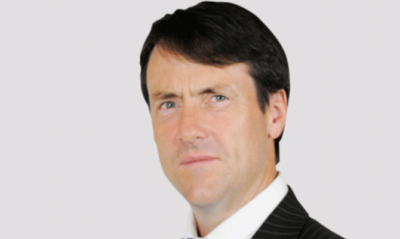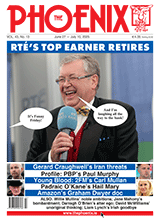
John Burns
STANDARDS HAVE fallen at The Phoenix if we are to believe the musings of Sunday Times journalist, John Burns. Goldhawk’s crimes amount to a failure to fall in behind efforts to undermine Ireland’s policy of neutrality and this magazine’s scrutiny of how the campaign of militarism has played out elsewhere in the Irish media.
As a frequent subject in our pages, a wounded John Burns might be forgiven for holding professional, even personal, animus toward the humble Phoenix, but our critic has the good grace to dress up any potential injury as a defence of the Irish Times – the newspaper which exhibited signs of extreme anguish when its own opinion polling last month revealed that voters remain unmoved in their attitude to war despite its best efforts.
The Phoenix reflects the view of this under-represented majority and readers will make up their own mind about agendas in the tone of coverage in print and broadcasting that has been heightened since Russia’s invasion of Ukraine.
Goldhawk has made its own case while documenting the contortions of others, but to Burns this amounts to The Phoenix tendentiously promoting what he believes is the outlook of its own editor.
Poor Goldhawk is chastised this week for having a political position. This argument might be on firm ground only it is not long since the same column gushed about Gript Media as sort of breath of fresh air in the media landscape. Gript is an entity wholly controlled by partisan socially conservative campaigners, though readers of Burns’ article were left in the dark (see The Phoenix 25/11/21). Double standards?
Chiefly though, this is an interesting hypothesis to read in a Rupert Murdoch newspaper, especially an aawarish satellite subject to the diktats of News UK headquarters in London. If what the journalist describes as “vituperative attacks” published in the modest Phoenix are difficult to stomach, then Burns will be extremely disappointed to learn what his colleagues have gotten up to the world over.
Such media malignancy is not confined to Fox News, The Sun, Sunday Times or others among Murdoch’s press either and Burns also says that The Phoenix “has made common cause” with Mick Wallace and Clare Daly – two figures who have been condemned on almost all sides in recent weeks.
He is not alone in making this observation, but, unlike others in the media, The Phoenix does not simply caricature online feedback as a means of dismissing critics. For example, there has been a suggestion on social media that independence at The Phoenix has been compromised recently due to these MEPs buying advertising promoting podcasts and events in which they put forward their own position – an initiative that itself gives an indication of just how lopsided the media onslaught in favour of Irish participation in war has been.
Even cursory readers will be aware that The Phoenix hardly needs to bought off on the issue of Irish neutrality. Footage recently uploaded online features John Mulcahy debating NATO membership on RTÉ television in 1974, nine years before he founded this magazine. That is consistency in principles approaching four decades, which results in advertising revenue following the journalism and not the other way around. This is the hallmark of a free media.
The Phoenix has in the past carried full page advertising from Senator Gerald Craughwell, whose politics on these issues could not be any further from those of Clare Daly and Mick Wallace. Neither influenced what is published elsewhere in this magazine.
The simple core truth in the controversy surrounding Daly and Wallace is that these representatives and some of their comrades have been viewed first as outliers and then as an aberration in Irish politics following continued public support. Wrapped up in histrionics about foreign policy are efforts by the forces of respectability to retake seats viewed as something they are entitled to. Throughout their political careers, both MEPs have demonstrated that they hardly require assistance from The Phoenix in responding to these challenges.
Burns concludes that The Phoenix fails to offer “even the slightest counterbalance” to its “skewed agenda” and yet throughout its history in coverage of politics, media, business, arts and the north especially, this magazine has often found itself alone as the counterbalance to powerful interests, client journalism and the prevailing narrative.
A reality being demonstrated anew in the midst of the present “mature debate” on neutrality.




